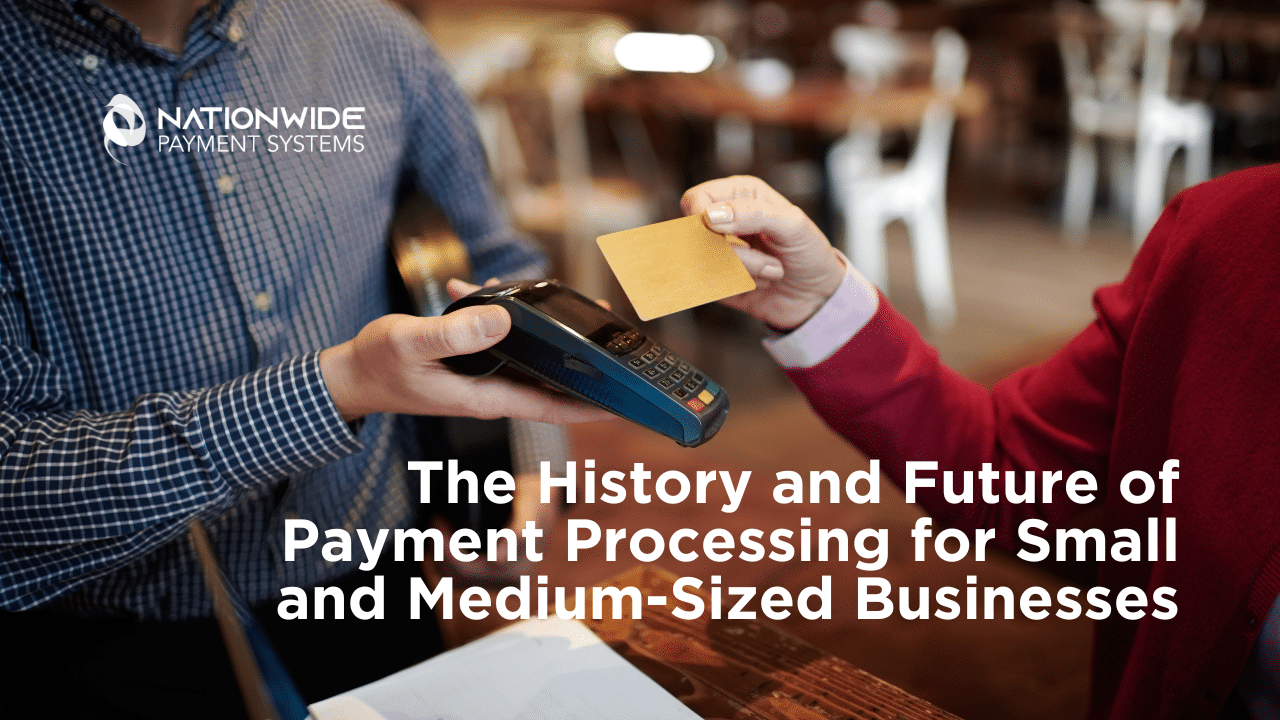The History and Future of Payment Processing

The History and Future of Payment Processing for Small and Medium-Sized Businesses
Nationwide Payment Systems – Customize Payment Processing
In the dynamic world of commerce, credit card processing is critical for small to medium-sized business (SMB) owners. The ability to process payments efficiently affects operational fluency and directly impacts customer satisfaction and retention. With the fast pace of tech advancements, the merchant services landscape continually evolves, presenting challenges and opportunities for business owners. Staying abreast of these changes is beneficial and essential for those looking to thrive in an increasingly digital marketplace.
The future of credit card processing promises to be an exciting journey marked by innovations that could redefine the checkout experience, enhance security, and improve business efficiency. For SMB owners, understanding and preparing for these trends is key to leveraging the opportunities they present. This blog aims to explore the advancements on the horizon of merchant services, delving into the technologies set to transform payment processing, the impact of regulatory changes, and how businesses can optimize customer experiences through innovative payment solutions.
As we embark on this exploration, it’s essential to acknowledge the current state of credit card processing: a complex interplay of technology, consumer behavior, and regulatory frameworks. From the traditional swipe and PIN to contactless payments and mobile wallets, the journey so far has been one of remarkable change. But what does the future hold? Let’s dive into the evolution of credit card processing to understand better where we’re headed.
Building on the foundation of the historical evolution of credit card processing, let’s explore the emerging technologies set to further revolutionize payment processing for small to medium-sized business (SMB) owners. This section delves into the innovations shaping the future of transactions, highlighting the benefits and considerations for businesses poised to adopt these technologies.
Section 2: Emerging Technologies in Payment Processing
The payment processing landscape is witnessing a seismic shift driven by technological advancements designed to meet the changing of consumers and businesses. These innovations promise enhanced security and efficiency and aim to provide a seamless and personalized shopping experience. For SMBs, understanding and embracing these technologies can be a game-changer, offering competitive advantages in an increasingly digital marketplace.
Contactless Payments: NFC and RFID Technologies
Due to global health concerns, contactless payments have surged in popularity with phones (Apple Pay & Google Pay) and EMV Tap to Pay. These technologies enable customers to make payments by simply tapping their card or smartphone near a credit card terminal, eliminating the need for employees to touch the card, significantly speeding up transaction times, and making it safer for consumers.
For SMBs, integrating contactless payment options can enhance the customer experience by offering convenience and speed and aligning with consumer expectations for hygiene and safety. Furthermore, the adoption of contactless payments opens the door for integrating loyalty programs and personalized marketing directly at the point of sale, offering businesses valuable touchpoints to engage customers.
Mobile Payments: Apple Pay, Google Wallet, and Other Smartphone-Based Systems
Mobile payments have become a staple of modern commerce, with platforms like Apple Pay and Google Wallet leading the charge. These systems securely store a user’s credit card information on their smartphone, allowing payments to be made effortlessly. This convenience is matched by robust security measures, including biometric authentication and tokenization, which ensure transaction safety.
SMBs adopting mobile payment technologies can cater to the growing segment of consumers who prefer using smartphones for transactions. This streamlines the checkout process and integrates seamlessly with online and mobile shopping experiences, creating a cohesive customer journey across all channels.
Cryptocurrency Payments: Bitcoin, Ethereum, and the Growing Acceptance of Digital Currencies
Although still in the early stages of mainstream commerce adoption, cryptocurrency payments represent a burgeoning frontier for business transactions. Cryptocurrencies like Bitcoin and Ethereum promise decentralized, secure, and fast transactions, appealing to a niche but growing market of tech-savvy consumers.
For SMBs, integrating cryptocurrency payments can tap into this emerging market, offering a differentiated payment option that caters to consumers seeking alternatives to traditional banking systems. However, businesses must navigate the volatility of cryptocurrency values and the evolving regulatory landscape surrounding digital currencies.
Biometric Verification: Fingerprint, Facial Recognition, and the Future of Secure Transactions
Biometric verification technologies are setting new standards for transaction security, using unique biological characteristics—such as fingerprints or facial features—to authenticate transactions. This approach not only enhances security by adding a layer of personal identification but also streamlines the payment process, making transactions quicker and more user-friendly.
Implementing biometric verification can offer SMBs a competitive edge in security and efficiency. As consumers become increasingly concerned about data breaches and identity theft, businesses prioritizing secure and convenient payment methods will stand out.
The emergence of these technologies heralds a new era in payment processing characterized by speed, security, and personalization. For SMB owners, the challenge lies in navigating this rapidly evolving landscape, identifying the technologies that match their business goals and consumers’ needs, and integrating these solutions to enhance the overall customer experience.
As we turn our attention to the regulatory and compliance landscape in the next section, we’ll explore how these technological advancements intersect with legal and security standards, shaping the future of credit card processing in the context of SMB operations.
Continuing our exploration of the future of credit card processing for SMBs, it’s crucial to address the impact of regulation and compliance on emerging payment technologies. As innovations evolve, so does the regulatory landscape, aiming to protect consumers and businesses while fostering a secure and efficient marketplace. Understanding these regulatory dynamics is essential for SMB owners to navigate future challenges and opportunities effectively.
Section 3: The Impact of Regulation and Compliance
The intersection of technology and regulation in the payment processing industry is complex, marked by ongoing updates to compliance standards and new regulatory initiatives designed to address emerging risks. For SMBs, staying ahead of these changes is not just about compliance; it’s about leveraging regulatory frameworks to build trust and ensure a secure customer transaction environment.
Overview of Current Regulatory Landscape
Key regulatory frameworks like the Payment Card Industry Data Security Standard (PCI) are crucial in shaping the payment processing ecosystem. These regulations outline the requirements for the secure handling of payment transactions and personal data to protect against fraud and breaches.
- PCI DSS provides security standards for businesses that accept payments, including merchants, processors, and banks, to ensure the secure handling of card data.
- GDPR, while broader in scope, impacts online payment transactions by setting stringent guidelines for collecting, storing, and processing personal data for entities operating within or targeting customers in the European Union.
Adhering to these standards is a matter of legal compliance and a cornerstone of building customer trust and safeguarding business reputation.
Future Regulatory Challenges and Opportunities
As payment technologies evolve, regulatory bodies continually adapt to address new challenges. Data privacy, cybersecurity, and integrating non-traditional payment methods (e.g., cryptocurrencies) are at the forefront of regulatory considerations. For SMBs, these future regulatory shifts represent both challenges and opportunities:
- Challenges: Navigating a complex regulatory environment can be stressful, particularly for smaller businesses with limited resources. Introducing new compliance requirements may necessitate upgrades to payment systems, new security measures, and ongoing staff training.
- Opportunities: SMBs that proactively adapt to regulatory changes have the potential to differentiate themselves in the marketplace. Showing a commitment to security and compliance can enhance customer trust and loyalty, potentially opening up new market segments, especially for merchants who have e-commerce websites or accept payments throughugh secure links.
Preparing for and Adapting to These Changes
SMBs can take several steps to prepare for future regulatory changes in payment processing:
- Stay Informed: Regularly monitor regulatory bodies and industry organizations’ updates on payment processing and data security.
- Invest in Security: Prioritize investments in payment processing technologies that offer advanced security features, ensuring compliance with current and foreseeable regulatory standards.
- Seek Expertise: Consider partnering with payment processing providers and consultants specializing in compliance, leveraging their expertise to navigate the regulatory landscape effectively.
- Educate Your Team: Ensure your staff is trained on the latest payment security and compliance and they keep up with security on your websites and portals.
The regulatory and compliance landscape is critical to the future of credit card processing for SMBs. By understanding and preparing for these changes, businesses can ensure compliance and leverage these standards to enhance their competitive advantage.
Next, we will focus on optimizing the customer experience through innovative payment solutions, highlighting how SMBs can use technology to meet consumer expectations and drive business growth.
Navigating the complexities of the future landscape for credit card processing, it becomes imperative for small to medium-sized businesses (SMBs) to not just adapt but excel in offering innovative payment solutions. This next section explores how embracing cutting-edge technologies can significantly enhance customer experience, positioning SMBs for success in an increasingly competitive market.
Section 4: Optimizing Customer Experience with Innovative Payment Solutions
In today’s fast-paced digital world, customer expectations are constantly evolving. The checkout process, often the last step in the customer journey, holds immense power in shaping the shopping experience. By implementing innovative payment solutions, SMBs can offer seamless, secure, and convenient transactions that meet and exceed customer expectations.
Importance of a Seamless Payment Experience
The payment process is a crucial touchpoint for customers. A smooth and efficient checkout can enhance customer satisfaction, encourage repeat business, and increase brand loyalty. Conversely, a simple and secure payment process can deter potential sales and damage the customer’s perception of the company. For SMBs, optimizing the payment experience is not just a value-add; it’s necessary in today’s competitive landscape.
Examples of How Technology Can Improve Customer Satisfaction
- One-Click Payments: By allowing customers to store their payment information securely and enabling purchases with a single click, businesses can drastically reduce checkout times and improve the shopping experience.
- Omnichannel Payments: Offering a consistent payment experience across all channels, whether in-store, online, or mobile apps, caters to the customer’s preference for shopping across multiple platforms.
- Personalized Payment Options: Integrating technology that analyzes customer data to offer customized payment options, such as installment payments or preferred payment methods, can significantly enhance the customer’s experience.
Future Trends That Will Shape the Customer Payment Experience
- AI and Machine Learning: Integrating artificial intelligence (AI) and machine learning technologies in payment systems can offer predictive analytics, fraud detection, and personalized shopping experiences, setting new standards for customer engagement and security.
- Voice-Activated Payments: As voice-assisted devices continue to gain popularity, voice-activated payments could become a convenient option for customers, further simplifying the payment process.
- Augmented Reality (AR) Shopping: AR technology can combine the immersive experience of in-store shopping with the convenience of online transactions, providing a unique and engaging checkout process.
For SMBs, adopting these technologies represents an opportunity to redefine the payment experience, offering innovative solutions that align with their customer’s evolving needs and preferences. By prioritizing the customer experience, businesses can enhance satisfaction and loyalty and distinguish themselves in a crowded market.
The future of credit card processing and merchant services is on the brink of transformative change, driven by rapid technological advancements and shifting regulatory landscapes. For small to medium-sized business owners, staying informed and adaptable is paramount to navigating these changes successfully. From the evolution of payment technologies to the impact of regulatory compliance and the imperative of optimizing customer experiences, the landscape of merchant services offers both challenges and opportunities.
Embracing emerging technologies, preparing for regulatory shifts, and prioritizing the payment experience can empower SMBs to survive and thrive in the future marketplace. As we look ahead, the proactive adaptation and innovative approach to payment processing will distinguish the leaders in the SMB sector, driving growth and fostering lasting customer relationships.
Adapting to the future of credit card processing is an ongoing process, requiring vigilance, flexibility, and a commitment to excellence. For SMB owners, the path forward involves:
- Leveraging technology.
- Understanding regulatory requirements and, most importantly.
- Placing the customer experience at the heart of their payment solutions.
By doing so, they can ensure that their businesses remain competitive, secure, and poised for success in the ever-evolving world of commerce.
This comprehensive exploration of the future of credit card processing for SMBs covers a wide range of topics, from technological innovations and regulatory considerations to the paramount importance of the customer experience. Nationwide Payment Systems is a technology-first company, and we work with clients of all sizes to match them with the right technology, gateway, processor, and bank to ensure a seamless experience for the business and its customers.








